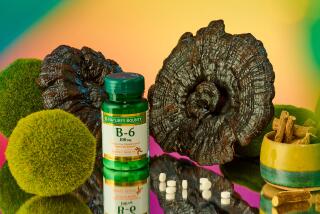Coconut water: A health drink that’s all it’s cracked up to be?
- Share via
It was evidently good enough for Gilligan and Robinson Crusoe. But is coconut water a healthy choice for people who aren’t stranded on a deserted island?
A longstanding treat in tropical regions across the globe, coconut water hit U.S. supermarkets a few years back and is now being marketed with a vengeance. Sometimes billed as nature’s sports drink, the slightly sour beverage has also acquired a reputation for being able to improve circulation, slow aging, fight viruses, boost immunity, and reduce the risk of cancer, heart disease and stroke.
It’s also fat-free, cholesterol-free, low in calories and chock-full of electrolytes.
But there’s news for people looking for a tropical shortcut to good health: On closer inspection, coconut water isn’t the cure-all it’s cracked up to be. “There’s nothing magical about coconut water,” says Liz Applegate, director of sports nutrition at UC Davis.
Coconut water is the juice found in young, green coconuts. On the beaches of Brazil and in other places, people often drink it through a straw stuck straight into the fruit. Unlike coconut milk, which is a high-fat emulsion of mature coconut meat, coconut water is, well, mostly water — about 95% water, in fact.
It also contains the electrolytes sodium, potassium, magnesium, calcium and phosphate as well as small amounts of many essential amino acids. That roster of minerals has made it popular among fitness junkies looking for a natural alternative to sports drinks without artificial colors or preservatives, Applegate says.
But though coconut water is fine for “the typical working-out person,” she says, it’s not for athletes engaged in intensive training, because compared with some commercial sports drinks, it is low in carbohydrates and sodium, which are essential for recovery following hard-core training.
Coconut water also contains very little protein, which is crucial in a true recovery drink, says Becci Twombley, director of sports nutrition at UCLA. She says that after a hard workout, adults need at least 15 to 17 grams of protein; 8 ounces of coconut water contains less than 2 grams of protein, according to an analysis that Singaporean researchers published in 2009.
On the other hand, coconut water contains up to 15 times as much potassium as the average sports drink. Like sodium, potassium is a key electrolyte that gets sweated out during exercise. But because the body loses more sodium than potassium during a workout, all that extra potassium isn’t necessarily important in a sports drink, Applegate says. (There’s certainly no harm in it either, she adds.)
A few small studies by researchers in Malaysia suggest that coconut water can rehydrate the body about as reliably as a sports drink and perhaps a little better than plain water. In one study, eight men exercised in the heat until they lost about 3% of their body weight and then drank either coconut water, plain water or a sports drink to rehydrate. All three beverages replenished the men equally.
In a second study, 10 men who exercised in the heat for 90 minutes drank either water, a sports drink, coconut water or coconut water plus sodium. After two hours, those who drank the sports drink and coconut waters were slightly more rehydrated — measured by the amount of body weight they regained — than those who drank the pure water. That makes sense, says Twombley, since electrolytes in the sports drink and coconut water would facilitate the body’s water uptake. The study was published in the Southeast Asian Journal of Tropical Medicine and Public Health.
Claims that coconut water can fight cancer, stop aging, boost immunity and perform other feats of health are based on even more preliminary studies in test tubes and lab rats. Such studies have suggested that specific plant chemicals found in coconut water may be powerful antioxidants, but many antioxidants exist in nature — there’s no proof that there’s anything “magical” about the ones in coconut water, Twombley says.
Leslie Bonci, director of sports nutrition at the University of Pittsburgh Medical Center, advises that consumers be wise to the claims that coconut water is low in calories and has no added sugar, as many labels boast. The water naturally contains about 11 or 12 grams of sugar and usually about 50 or 60 calories per serving; flavored varieties have more of both.
For those using coconut water as a replacement for plain water after a workout, the calories and sugar can add up.
And, at $2 a bottle, so can the price. Coconut water is fine for casual athletes and people who just like the taste, Bonci says, but there are much cheaper ways to rehydrate and restore electrolytes. One idea: “How about having a glass of water and a banana?”
More to Read
Eat your way across L.A.
Get our weekly Tasting Notes newsletter for reviews, news and more.
You may occasionally receive promotional content from the Los Angeles Times.










